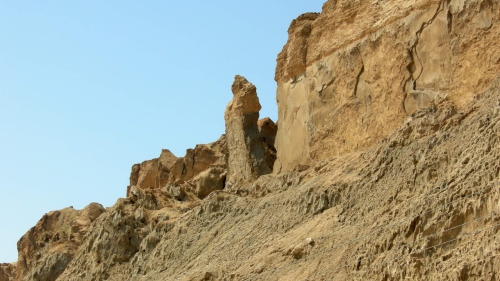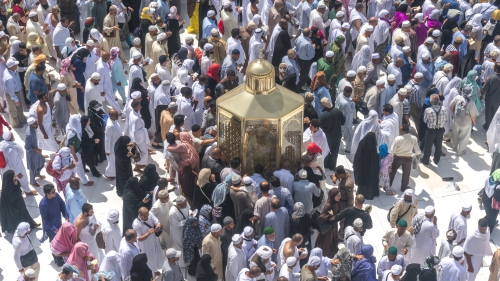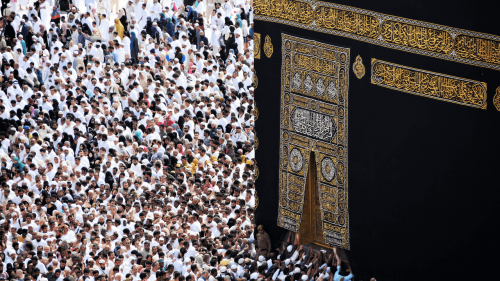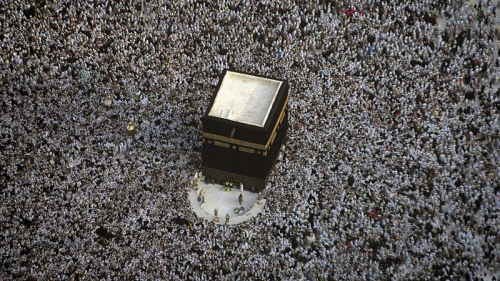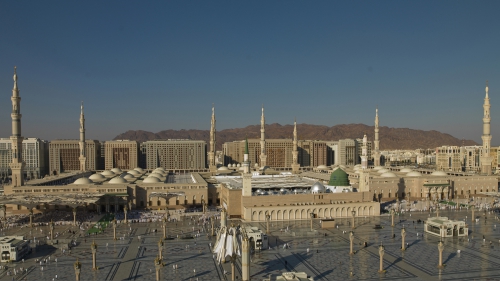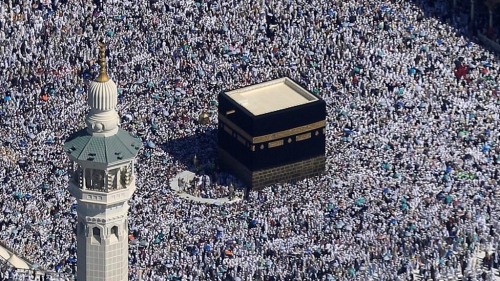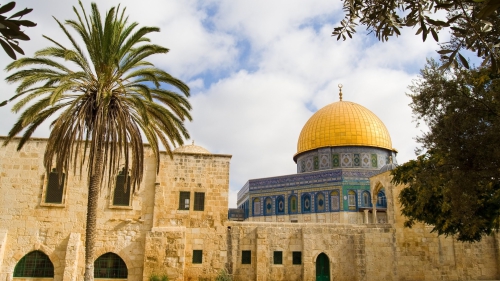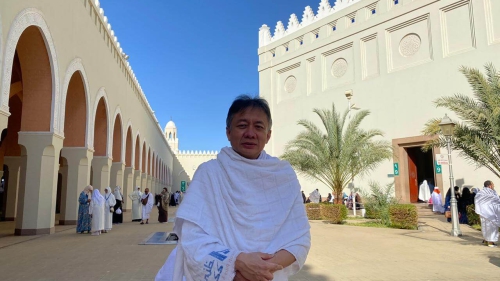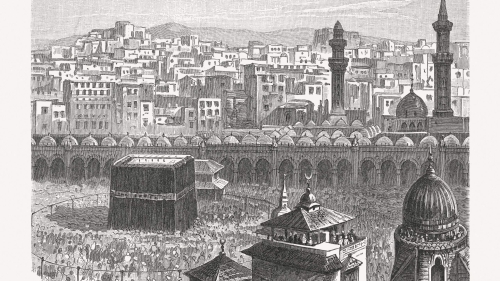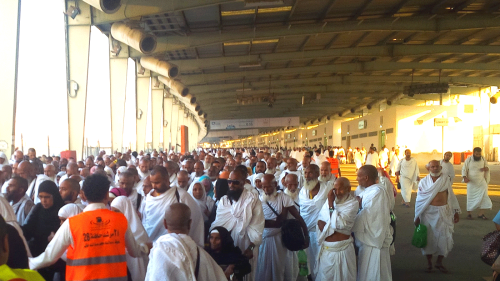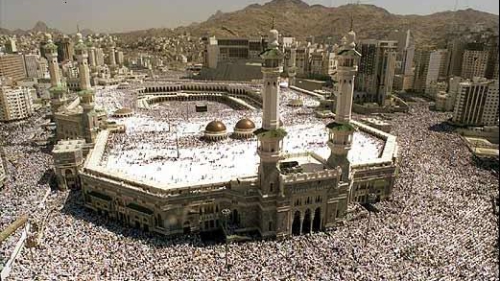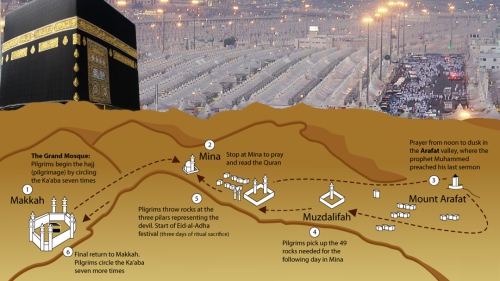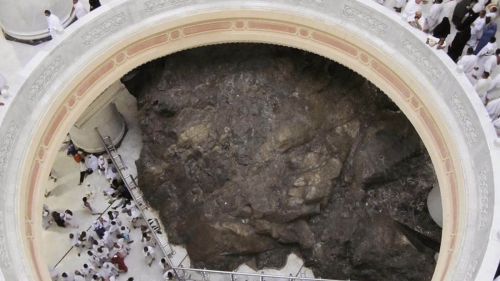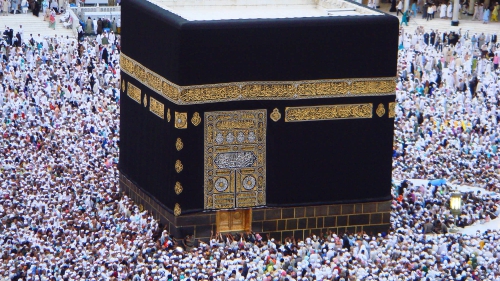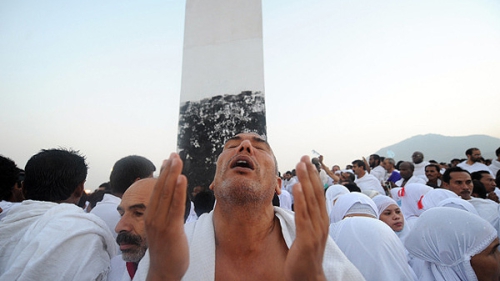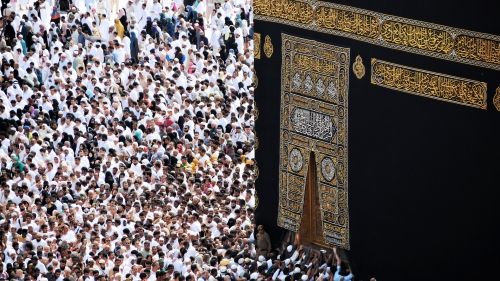The Soul of Hajj
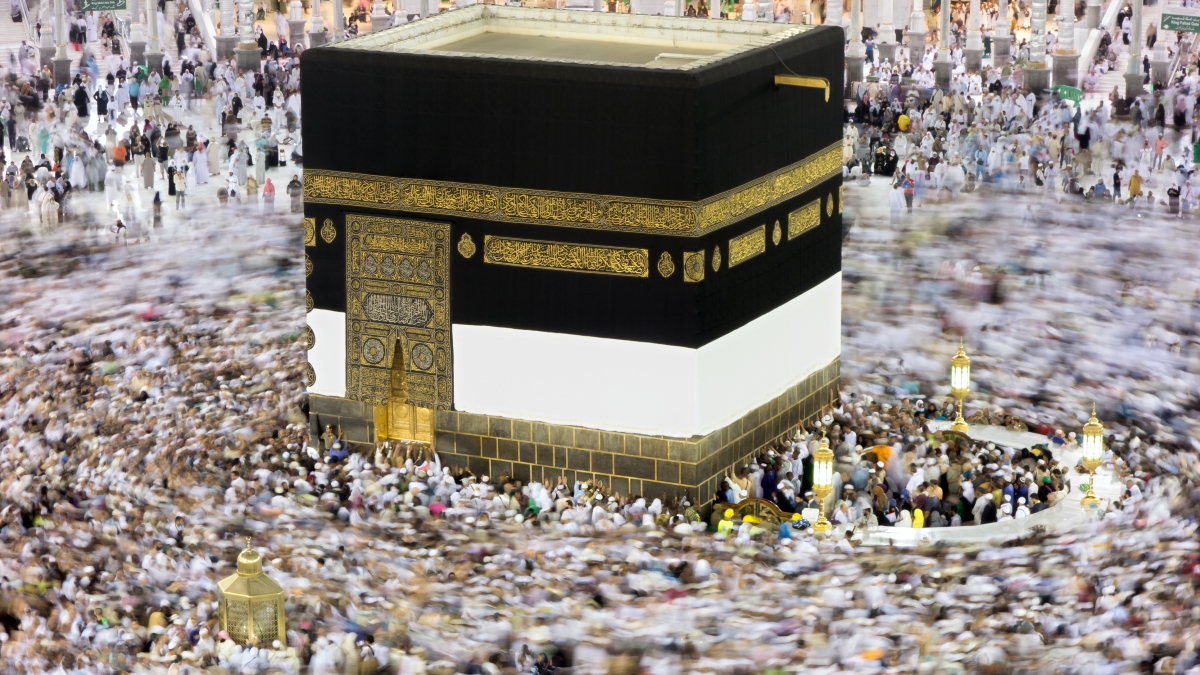
No annual event on the face of the globe, religious or non-religious, compares to hajj in terms of the sheer number of participants, duration of the event and the breadth of agenda. In spite of this fact, it has always remained equally fascinating and mysterious to not only non-Muslims, who are not allowed to enter the area, but also to millions of Muslims, who had not performed Hajj.
What then is Hajj? In essence, hajj is man's evolution toward Allah; his return to Him. It is a symbolic demonstration of the philosophy of creation of Adam , the first man. To further illustrate this, it may be stated that the performance of Hajj is a simultaneous show or exhibit of many things. It is a show of creation. It is a show about history. It is a show of unity. It is a show of Islamic ideology. It is a show of Ummah, the community of Muslims. That is why it is said in the Quran: "And proclaim unto mankind the Hajj. ... That they may witness things that are of benefit to them." (Quran 22:27-8)
Just as in any other good show or movie or theatre-play, the following conditions prevail in Hajj. Allah is the Stage Manager. The theme portrayed is the actions of these main characters - Adam, Haw'a (Eve), Ibrahim, Hajera, Isma'il , and Shaytan. The main scenes are - Masjid al-Haram, 'Arafat, Mas'a (space between the mountains - Safa and Marwa), Mash'ar (area between 'Arafat and Mina) and Mina. Important symbols are - Kaba, Safa, Marwa, day, night, sunshine, sunset, idols and rituals of sacrifice. The dress and make-up are - 'Ihram, halq, and taqseer (part of ceremonies of hajj involving cutting of hair and nails, afterward). Lastly, the player in the show is - YOU - the Hajji. You are the main feature of the performance. The role of Adam, Ibrahim, Isma'il and Hajera in a confrontation between Allah and Satan is all played by you. As a result, you are the hero of the show!
Hajj is a duty unto Allah for mankind, for him or her who can find a way or means to get there (Quran 3:97). It is not a tax on your wealth, but a duty. Thus, to qualify, you must be sane and wise to understand what you are getting into, and able-bodied to go through this task, and lastly, have the means or resources to perform Hajj.
The pillars of hajj are five
(1) 'Ihram, (2) waiting at 'Arafat, (3) Tawaf of the Ka'ba, (4) sa'iy or running between the Safa and the Marwa and (5) cutting or trimming of hair.
Others are not pillars, although some may require kaffara or penalty, if not done. The person who puts on the 'Ihram or cloth for either 'Umrah (lesser pilgrimage) or hajj (greater pilgrimage) is called a Muhrim.
The months of Hajj are the three.
These are the Arabic months of Shawwal, Dhul-Qadah and first ten days of Dhul Hijjah. Thus, one cannot put on Ihram before Shawwal. Hajj and 'Umrah are performed in three ways - ifrad, tamattu and qiran.
1. Ifrad involves first performing Hajj and then Umrah.
2. Tamattu is when one first performs Umrah and then Hajj, both in the same year with some break in between the two.
3. Qiran is when one puts on the 'Ihram with the intention of combining both Hajj and 'Umrah without any break in between the two.
There are ten etiquettes of Hajj:
1. Requite all wrongdoings and satisfy all adversaries.
2. Make provision for hajj from one's lawful wealth.
3. Learn the pillars of Hajj and its ceremonies.
4. Be kind and forbearing with others, lest the reward be nullified.
5. Observe the obligations of prayers and its statutes.
6. Be open-handed, maintain the poor and spend as much as he/she is able to.
7. At the station of 'Arafat, remember the Day of Judgment (Yawmil Qiamat).
8. Should not miss visitation of the Prophet's grave in Madinah.
9. After return from Hajj, one should turn toward Akhirat (Hereafter).
10. One should remember his parents and other close relatives who have passed away with pious prayers and make-up for them if they could not fulfill their obligations for hajj.
The steps of Hajj:
Miqat - putting on 'Ihram at designated places with wudhu.
The show of hajj begins with Miqat. At this point, the participant must change his/her clothes. Clothes show individuality, status, preference, and distinction. They create superficial barriers that separate man from man. The concept of "I" (and not "We") emerges which gives birth to discrimination. At Miqat you assume your original shape as a "man", just one of "children of Adam" who will die one day. The cloth of 'Ihram is, therefore, the antithesis to that "individualism", it is the kafan (or burial shroud). You wear the kafan, the two pieces of cloth, just like everyone else. You join the mass, the multitude and become nothing or just a drop of water in the ocean that has no special identity of its own. An atmosphere of genuine unity prevails everywhere. It is a human show of Islamic unity, it is a show of universal brotherhood. The bodies were left in Miqat and the souls are motivated here. This is the beginning of your journey, your voyage to nothingness. There is no sex, no perfume, no shoes, no sewn clothes and head covers for men, no face mask, no cutting of hair or nails, i.e., absolutely no signs of aristocracy or distinction. In the state of Muhrim, you don't even look in a mirror to see your own image. You don't hunt any animal, you don't uproot any plant. So you kill the tendencies of aggression by being peaceful to nature. You cease to remain or behave like somebody. Hajj is a movement to returning to Allah, just as Allah says in the Quran: Wa ilal-lahil maseer (24:42), meaning, "Unto Allah is the journeying." All your selfish egos must be buried at Miqat. You witness your own dead body and visit your own grave. By sacrificing your individuality, you focus on reality, the basic purpose for which you were created - that being a slave unto Allah. Just as when you would be buried in two pieces of cloth, leaving behind all your wealth and worldly belongings, here in Miqat you practice a dress rehearsal for that inevitable event.
It is preferable that you enter Makkah during the daytime.
Each step you take toward Ka'ba, your heart pounds. The weight of being close to Allah's house seems to get heavier and heavier. You are endowed with a mixed feeling of love and fear. Love, because you have waited this long to get here. Fear, because you don't know whether you can endure the strain of rituals of hajj, fulfill your duty unto Allah and be born again as an innocent human being.
Make du'a (supplication) for Ka'ba upon seeing it.
Remember this is the Baital Haram - the Sacred House - appointed by Allah (Quran 5:97). This is the first house of worship on the face of the globe. It is to this house that you face while praying. It is also the direction in which your face would be turned when you are buried as dead. It is the center of existence, faith, love, unity and life. It has its own history. It is called Baitil Masabatal-lin-nass wa amana, i.e., the House of resort for mankind and a sanctuary (Quran 2:125). It is also called Baitul Atiq - the Ancient House - in the Quran (22:29). Ibrahim prayed for its security and blessings.
The concept of Tawaf (circumambulation) of Ka'ba
You perform Tawaf (circumambulation) of Ka'ba seven times unless it is time for a regular prayer led by an Imam, which you need to join in.
Just as planets of our solar system orbit around the sun, you orbit around the world's sun - the Ka'ba, and become part of a universal system. You demonstrate your love for Allah by making Tawaf around His house. Tawaf should be started from the cornerstone - the Black stone, Hajr al-Aswad - with Ka'ba on the left. This is where you make a contract to join all the tribes of the earth, and become like a drop of water entering the ocean. The moment of truth has come and you must select your path, distinct from those who had rejected their Creator. Three of the seven Tawafs must be at a faster pace than normal walking. You should try to touch the stone with hand, and put your forehead on it and then kiss it. By touching the stone, you have shown your allegiance to your Creator, who had sent this very stone from the heaven, so that He could know your love for Him. By touching the stone, you have cut off all forms of allegiance to anything other than Allah, you have become free again from the servitude of men and this world. During Tawaf, you become part of the cosmos. You forget about yourself. You are in love with the symbol of unity and servitude to Allah. You see nothing but His symbols, the Ka'ba and the Black Stone, Hajr al-Aswad. By denying yourself you have become a lover of Him just like Hajera who migrated to this land, barren and rugged, without vegetation, without any forms of subsistence, but with complete reliance in Her Lord, Allah Subhana Wa ta'Ala (SWT). And Allah did not neglect either her or her infant son. He brought out the Jamjam well and let people settle there, making it the most important place in the Arabian peninsula. Remember that some rituals of Hajj are, in reality, a memory of Hajera. Hijrah or migration is what Hajera did. Any migration like hers is a move toward civilization.
During Tawaf, everyone encircles the Ka'ba collectively. The movement is of one unit and there is no individual identification of men or women, black or white, red or yellow. The movement has transformed one person into the totality of a "people." All of the "I's" have transformed into "We," establishing the universality of ummah with the goal of approaching Allah. Likewise, all your self-centeredness must go and transform into self-denial or ummah-centered activities. Allah's way is the way of the people. In other words, to approach Allah, you must first approach people. That is why individual activities in Islam are less meritorious than collective actions. You step out of the Tawaf cycle at the same place you started after completion of the seven orbits. This is just like being resurrected from the same spot where you would be buried.
Praying two rakah of prayer behind Maqam-e Ibrahim
After Tawaf, perform two rakah of prayer behind Maqam-e Ibrahim in which you pray Surah al-Kafirun in the first rakat and Surah al-Ikhlas in the second.
Maqam is a very blessed place for praying (Quran 2:125). It is the nearest point to Allah. As a matter of fact, there is no place in this entire earth where you get more reward than this place for praying. The stone has the footprint of Ibrahim , the rebel against the established despot of his time, Nimrod. He stood over this stone to lay the cornerstone - Hajr al-Aswad and to re-construct the Ka'ba and to pray (Quran 2:125). Do you now understand where you are standing? By standing on the same stone, you vow to become like Ibrahim Hanifah wa Khalil-Allah, the upright friend of Allah, who was uncompromising in his conviction of Tawhid. In Maqam, symbolically, you shake hands with Ibrahim
by pledging the same dedication to Allah - i.e., to be like Ibrahim and Isma'il
, his son.
Runing between the mountains - Safa and Marwa
Run between the mountains - Safa and Marwa - seven times, starting with the Safa and ending with the Marwa.
This is called Sa'iy. Literally, it means search, a movement with an aim. It is depicted by running and hurrying. Here you act like Hajera, the mother of infant Isma'il. She had no food, no water, no shelter, neither for herself nor for her child, but only uncompromising, relentless faith that the God of Ibrahim will not leave her and her only son without sustenance. Remember, when Ibrahim
left her and their only son, Isma'il
near the valley of Makkah, Hajera asked him: "O Ibrahim, where are you leaving us, while there is no habitation of men nor any provision for food and drink? Who is going to look after us?" Ibrahim
replied, "Ilal-lah (to Allah's protection only)." She said, "Raditu billah (I am fully satisfied with Allah?" She also asked, "Have you done this to fulfill Allah's command?" When Ibrahim
confirmed that by saying, "Yes," she simply said, "Well in that case, we have no fear, for Allah will not let us die without providing any provision [i.e., He will definitely provide for us in the middle of this desolate, barren desert]." [Bukhari] Do you see the strength of her trust in Allah? Away from the view of his wife and son, Ibrahim
prayed, "Our Lord: Lo! I have settled some of my posterity in an uncultivable valley near unto Thy Holy House (Ka'ba), Our Lord! that they may establish proper worship. So, incline some hearts of men that they may yearn toward them, and You provide them with fruits in order that they may be thankful." (Quran 14: 37). Soon, however, Hajera's water and food were all gone, there was no milk or water or any food either for herself or for her child. She started looking out for water, running to the top of the mountain, Safa. No, there is no water anywhere. Then she comes down and looks at her infant to check if he is fine. She then goes to the top of the other mountain, Marwa, and takes a deep long look to fetch water. She was searching water, why? Because it is needed for physical salvation, for life to continue. So, should man work for livelihood, trusting in Allah. She searches again and again. After running seven times between these two mountains, she comes down from Marwa to see the condition of her infant son. She hears the sound of gushing water coming from near her son and is surprised to see an angel (Jibril) dig a well near the heel of her infant son. The gushing water from the well was making all that sound. She quickly puts a barrier around it so that water could be stored and that it did not overflow. And this well came to be known as the Jamjam. Muhammad
said, "May Allah bless the mother of Isma'il
. If she had not put that barrier around the Jamjam, instead of a well, the gushing water would have continued to flow like a spring [and flooded the entire valley]." It was a gift from Allah to the mother and son, and all those who came later. It is a mineral water rich with nutritional and medicinal power to cure man of many diseases. The Safa and the Marwa, thus, became among the signs, indications of Allah (Quran 2:158).
Going to Mina
On the seventh day of Dhul-Hijjah, after the Zuhr prayer, Imam explains the meaning of Hajj and exhorts people to go to the valley of Mina (nearly six miles north of Makkah) next morning after Fajr prayer.
Visit and stay at Mina on the eighth day (after arriving there in the morning) till the next Fajr (dawn prayer).
Going to Arafat on 9th DH
Go to Arafat after the sun has risen on the ninth, stopping on the way at Namirah and listening to khutbah before Zuhr (mid-day prayer).
Proceed to 'Arafat (five miles further north) and seek Allah's forgiveness there till Maghrib (prayer after sunset).
'Arafat literally means knowledge and science. 'Arafat represents the beginning of man's creation, that of our forefather Adam. It was shaytan who misled our forefather by whispering to him saying: "O Adam! Shall I show you the tree of immortality and power that wastes not away?" (Quran 20:120) He caused the downfall of Adam and Haw'a (Eve). For years, they were separated from each other having descended at different places. It was in 'Arafat that they met again. It was in a small rocky hill of Jabal al-Rahma in the center of 'Arafat that their sins were forgiven by Allah. So, here in 'Arafat, you act like Adam or Haw'a and seek forgiveness for you and your loved ones.
Staying in Muzdalifah is part of Mash'ar-ul-Haram
After sunset proceed slowly to Muzdalifah (halfway between 'Arafat and Mina) without praying (Quran 2:198). However, the Imams Abu Hanifah and Sufyan al-Thawri (R) said it is permissible to pray Maghrib before reaching Muzdalifah.
Spend the night before Eid in Muzdalifah. Pray Fajr early. Collect pebbles there (70 per person).
Muzdalifah is part of Mash'ar-ul-Haram. Our Prophet Muhammad prayed for long duration here. You must be in Mash'ar by the nightfall (while you were at Arafat during the day). Darkness engulfs you in Mash'ar. Arafat is knowledge, it requires daylight for clear vision. Mash'ar literally means consciousness and understanding. Such blossom at night through deep reflection or meditation. So, Mash'ar is the stage of insight while Arafat was the stage of experience. Intuition needs no light. It can see in the darkness. It is the stage between knowledge and love, or Arafat and Mina. Here you reflect upon yourself and strengthen your spirit. Are you not in the right way? Are you ready to fight against Satan or his insinuations? In Makkah, during tawaf you joined the crowd and became part of them. Here you are alone, despite being within a crowd. Here you are for yourself only. Therefore, confess your sins to Allah. And this night is a good cover for your tears. Take preparation for tomorrow by getting ready tonight. There is a great battle in which you have to participate tomorrow. So, collect your weaponry - the pebbles - before the day breaks. The pebbles will be used against your enemy. You have to act like Ibrahim
here just as he fought against the insinuations of Satan on his way to sacrifice his beloved son, Isma'il
.
Throwing stones at Jamrat
Go back to Mina and throw seven stones at Jamrat-ul Aqabah, reciting Takbir each time. The remainder 63 stones should be thrown over the next three days of Ayyam al-Tashriq (11th, 12th and 13th of Dhul Hijjah) at a rate of 21 stones per day. Every day, throw the first 7 stones at Jamarah near Mina, and the last seven at Jamarat al-Aqabah, located closer to Makkah.
The day of sacrifice
The tenth day has arrived. This is the day for the sacrifice of an animal. You are armed with weapons to fight Satan, the enemy of your forefather, the devil who tried to confuse Ibrahim . Mina literally means love. Ibrahim
felt too much love for his only son, Isma'il
. And Allah wanted to test how great or how real his love was for Him. Ibrahim
saw a vision of sacrificing his most beloved son. That was the command from Allah to test Ibrahim
of his love and devotion. Can Ibrahim
pass this test? He ponders on this unusual, rather cruel, test. He has grown old and he has no other offspring. In his very old age, Allah has listened to his prayer and has blessed him with this son through his second wife, Hajera. As a thanksgiving for answering his prayer, he has named his son, Isma'il (meaning: God listened [to my prayer]).
Remembering the sacrifice of Prophet Ibrahim
Yet, Ibrahim was asked to settle Isma'il and his mother in the valley of Makkah when the child was still an infant. And now that the lad has become old enough to walk and reason, Allah wants him to sacrifice that son to prove that his true love is only for Allah. Just ponder on this for a moment (Quran 37:102). Don't you get a chill in your back? Satan tries to create doubt in his mind: 'O Ibrahim, are you sure you want to sacrifice your son, your true love, your joy, the meaning of your existence, the fruit of your life; who would there be after you to worship your Lord; don't you have heart, any soft feelings toward your son?' Ibrahim
is momentarily confused. Should he or shouldn't he carry out Allah's command, "you must sacrifice your son?" Is he dreaming or is it the reality? No, there is no confusion what he saw in his vision is crystal clear; God truly wants him to sacrifice his beloved Isma'il. He wins over Satan, the sneaking whisperer. But then Satan returns and tries to digress him from his task. Ibrahim
wins over again. But Satan does not give up that easily, he tries to create confusion for the third time. Ibrahim
wins over Satan's temptations yet for the third time. He is mentally all prepared to carry out the task. His choice is obvious - absolute obedience and devotion to Allah; Isma'il must be sacrificed. He wanted to share the message with his lad. Thus, he talks to his young lad, Isma'il
, of his dream and asks his opinion. And what does this "gentle" son (whom the Quran calls Ghulamin Halim) reply? He calmly says: "O my father! Do that which you are commanded. Allah willing, you shall find me of the steadfast." (Quran 37:102) He answers like the rock of Gibraltar!
What did you expect? Did you expect the son of Ibrahim , the upright, to be any less faithful than his father? So, here in Mina, you act like Ibrahim
, the soldier of Tawhid (monotheism), ready to defeat, subdue or shoot down your real enemy, the Satan within you representing your personal egos, desires, cravings, and preferences. These "other" things, the "idols", were distracting you from the true worship of God. But here in Mina, you are now ready to fight against these taghoots (demi-gods) to show your true devotion and obedience to Allah. You fight Satan just as Ibrahim
had fought against him. To mimic that event, you throw stones at Satan at the three Jamarats.
Qurbani or sacrifice an animal, saying only Bismillah.
When both the father and the son - Ibrahim and Isma'il - had surrendered to Allah and Ibrahim
had flung Isma'il
down upon his face and was about to put the knife on his son's neck, Allah called Ibrahim
: "O Ibrahim! You have already fulfilled the vision." (Quran 37:104-5) Ibrahim
doesn't have to sacrifice his son. Instead, he should sacrifice this ram, which has been sent to him, as a ransom for Isma'il
. Unlike the false-gods of polytheism, Allah, the One True God, is not bloodthirsty. He just wanted to check where Ibrahim
stood in his devotion and love, whether he was capable of overcoming his personal feeling of love for his son to please Allah. A lesson was taught by Allah - from now on there would be no human sacrifice in the altar of God. The sacrifice of a halal animal whose meat you can eat and distribute among the poor is a sufficient substitute.
What was Prophet Ibrahim asked to sacrifice?
Ponder again. What was Ibrahim asked to sacrifice? It was nothing short of the most beloved thing/entity among his possession. But when he was ready, his Isma'il was returned unto him, unscathed and unharmed. And he was made a model for humanity: "And We left for him [Ibrahim
] among the later folk (the salutation): Peace be unto Ibrahim. Thus do we reward the good." (Quran 37:108-9) If you love something more than you love Allah, then that thing has become your idol and you must be ready to sacrifice that. Are you ready to slaughter your worldly desires, worldly love, your Isma'il in Mina in order that you be free from all attachments save those of Allah? If you are, then slaughter a goat, sheep, ram, cow or camel as a ransom towards your Isma'il. As Dr. Shariati rightly puts it, "To offer a sheep instead of Isma'il is a "sacrifice", but to sacrifice a sheep just for the sake of sacrifice is "butchery"!" (Ref: Hajj by Dr. Ali Shariati) For surely Allah says, "Their flesh and their blood do not reach Allah, but the devotion from you reaches Him." (Quran 22:37)
Men should shave their head or trim their hair, at least, one-quarter of the head. Women should not shave their head but only trim slightly at the end of the lock of a hair.
After the Qurbani (sacrifice) of the animal, you have almost completed the basic requirements of Hajj, so you can make an end of your unkemptness (Quran 22:29). You have defeated Satan but you may not have succeeded in completely killing it. You may have defeated him outside but he comes back inside of you. So, you should stay for the next three days in Mina and continue with your battling of the Satan at Jamarat.
After shaving or trimming the hair, you should go to Makkah and make the Tawaf of visitation and run seven times between the Safa and the Marwa. Then your hajj is complete and you can come out of Ihram.
Summary understanding of the meaning of Hajj stages
This is the latter tawaf of the Ka'ba (Quran 22:29), performed after you return from Mina. In Mina, you have defeated Satan and renewed your ties with Allah by following the footsteps of Ibrahim . When you first approached Ka'ba you had not, by then, purified yourself. You were still impure and unconscious. In Arafat, you gained consciousness. In Mina you purified yourself. So, this is appropriate that you do the tawaf and sa'iy in the purified state before you return home. During the rituals of Hajj, you played the roles of Ibrahim
and Hajera. Do not replace your role-playing to something else when you return. Like Hajera, always trust in Allah. Like Ibrahim
fight the fire of Nimrod, i.e., oppression. Like Ibrahim
be prepared to sacrifice your Isma'il, i.e., love or desires, for the sake of your faith. That is the essence of Hajj. You return to Allah the way He wanted you to be: a slave totally dedicated to his/her Master.
In closing, let me quote from Ali bin Uthman al-Jullabi al Hujwiri's (R) Kashf al-Mahjub. A certain man came to Junayd [al-Baghdadi] (R). Junayd asked him whence he came. He replied: "I have been to hajj." Junayd (R) said: "From the time when you first journeyed from your home have you also journeyed away from all sins?" He said, "No." "Then," said Junayd (R), "you have made no journey. At every stage where you halted for the night did you traverse a station on the way to Allah?" He said: "No." "Then," said Junayd (R), "you have not trodden the road stage by stage. When you put on the Ihram (pilgrim's garb) at the proper place did you discard the attributes of humanity as you cast off your ordinary clothes?" "No." "Then you have not put on the Ihram. When you stood on 'Arafat did you stand one instant in contemplation of Allah?" "No." "Then you have not stood on 'Arafat. When you went to Muzdalifa and achieved your desire did you renounce all sensual desires?" "No." "Then you have not gone to Muzdalifa. When you circumambulated the Ka'ba did you behold the immaterial beauty of Allah in the abode of purification?" "No." "Then you have not circumambulated the Ka'ba. When you ran between Safa and Marwa did you attain to the rank of safa (purity) and muruwwat (virtue)?" "No." "Then you have not run. When you came to Mina did all your wishes cease?" "No." "Then you have not yet visited Mina. When you reached the slaughter place and offered sacrifice did you sacrifice the objects of sensual desire?" "No." "Then you have not sacrificed. When you threw the stones did you throw away whatever sensual thoughts were accompanying you?" "No." "Then you have not yet thrown the stones, and you have not yet performed the pilgrimage. Return and perform the pilgrimage in the manner which I have described in order that you may arrive at the station of Ibrahim ."
May Allah grant us the vigor to follow the dictates of hajj so that this duty is acceptable unto Him.
Habib Siddiqui lives in suburban Philadelphia, PA, and is the author of the book "Islamic Wisdom". This essay is based on the book "Hajj" by Dr. Ali Shariati.
Topics: Hajj, Prophet Ibrahim (Abraham), Prophet Ismail (Ishmail) Values: Sacrifice Channel: Hajj - Day 1
Views:70085
Related Suggestions
jazakum Allah khair
this is a powerful writing...Alhumdulilah, thanks for posting it--insha Allah, I will share it with others
i enjoyed every bit of it. educational and inspirational. May Allah(swt) grant us with the blessing of hajj.
Need step by step instruction....
my email address is
salimacurzi@msn.com....
Appreciate the education....
My prayers for all our brothers and sisters
May Allah reward you for all that you are doing for us Muslims.
The article has a lot of imagery that is like a puff of hot air. You describe the story without adding your research.
This what should have been described: Why we circumambulate anti-clockwise and not clockwise, Why on a trot the first 3 and normal walk the last four circuits?, Why Ihram shifts under the arm first three and over the shoulder last 4 circuits? Why "Arafat is Hajj" the Hadith... and so on.
Doc. DO YOUR HOMEWORK FIRST BEFORE WRITING
When I returned from hajj in 1998, I wanted to help anyone and everyone that Allah had invited to His House. Every year since then I have shared the excitement, tears of joy and sometime disappointment as my fellow Sisters and Brothers in Islam make earnest efforts to answer Allah's call. How honored I am to be in such a position with six other dedicated people who were there doing this work before me and all have similar stories.
My words cannot explain the journey. It was like a melt-down of the soul for when you come away, if you did not know before the journey, you truly know that, Allah (saw) alone is enough.
May Allah Subhannah wa'ta ala continue to shine His Nur on Dr. Habib Siddiqui for such heart touching words. For those of you that have not made hajj yet, start by making your intentions to do so. I have witnessed many who have made intentions to make hajj without the total cost they needed. It seemed like once they made the intention and an earnest effort, Allah took it from there. Only by Allah's leave were their needs met to make the journey of a lifetime with very few tests. Try it.
Hajjah Fatima Abdul-Malik
Al-Mu'adhdhan Hajj Group, Philadelphia, PA
Ma Salam
The questions raised by Dar apparently shows her/his ignorance of Islam.First and foremost, the sharia does not prevent Muslims from questioning any issues which Muslims are not clear of.And what's this issue about women? Bed time story.Though there may be lots of work to do, but Muslim women have developed almost everywhere. Sorry Dar,but which cave have you been in? Sincere questions beget sincere and truthful answers. Suspicious,ill intended questions will be frowned over.
How could you question Allah's subhawataala will?Why the Bengals as an example? There are other parts of the world who face nature or man made disaster too.Iran for one, just faced a terrible earth quake? So what? If Allah subhawataala decides that He wants to test His servant's faith He deems fit,we as servant just need to have our Iman strengthened, and use our God-given brain to move on and be good Khalifah in our own rightful surroundings. Everybody is a Khalifah to him/herself to say the least. I wonder if Dar even knows that.So, if the Shaytan wants to divert God's servant from the truth, it is the person himself who needs to seek God's guidance in ensuring that he is not misguided till his last breadth.
Too bad you went to Umra and see other people's negativity, instead of thinking, how you could improve yourself so as not to be caught in such negativity.
As for the rest of the "historical questions", I can only advice you to come out of your frame of mind, and read more books and articels about the history of Haj,Mecca and everything else.There are lots of such books around.Yes, we are lucky to live in this period, because the chances to get the right perspective and be guided is everywhere. Clear your intentions first, and you'll find the answers.Rest assure Dar, you are surrounded by them.BTW, if you are sincere, you wont even bother hiding your identity.
Wassalam
Assalam Alaikum
Al Hamdulillah, your article "The Soul Of Hajj" is par excellent in many ways. May Allah reward you on this piece of "Intellectual Charity" which is not that abundant among Muslim intellectuals.
With due apologies to your scholarly personality may I take liberty to seek following clarifications.
1-Trimming or Shaving hair for men is Wajib, but you have put it under pillars of Hajj. Please clarify.
(1) 'Ihram, (2) waiting at 'Arafat, (3) Tawaf of the Ka'ba, (4) sa'iy or running between the Safa and the Marwa and (5) cutting or trimming of hair.
2-The intention of visiting Madinah should be to visit Prophets Mosque not the grave. Please clarify
Should not miss visitation of the Prophet's grave in Madinah
1.Should not miss visitation of the Prophet's grave in Madinah.
3-Is Umrah a must for Mufrid (one who performs Hajj by Ifrad)
1-Ifrad involves first performing hajj and then Umrah
2.Tamattu is when one first performs Umrah and then hajj, both in the same year with some break in between the two.
3.Qiran is when one puts on the 'Ihram with the intention of combining both hajj and 'Umrah without any break in between the two.
Allah Hafiz
Fairoz Ahmed
Those that are themselves misgided and seek to misguide others choose to talk about the practises of the pre-islamic pagan Arabs but conveniently forget the origin of those practises in the lives of the righteous Prophets of Allah Ibrahim and Ismael (ahs). Moreover, they forget their lowly origins and question the right of the All Powerful Allah to test his slaves, especially HIS righteous servants amongst mankind, namely the Prophets and Messengers .... Ibrahim, Ismael, Yusuf, Ayyub and of course the Seal of the Prophets Muhammad (Saws) who were all tested with trials and from the seeds of those trials sprang forth the mighty trees of faith and guidance which lead mankind to the right path to this day.
The racist ones amongst the rebels of Ar-Rahman, are also infuriated that God's covenant was taken away from the treacherous Jews, may Allah curse them, in response to their ingratitude to Allah. The Kuffar can read in their own book:
Jesus said to the Jews: "Therefore say I unto you, The kingdom of God shall be taken from you, and given to a nation bringing forth the fruits thereof.(KJV Bible, Matthew 21:43)"
So why are they surprised that Allah favored this nation with a Qibla that pleased the eyes of our noble Master and Leader Muhammad (saws).
"Fain would they extinguish Allah's light with their mouths, but Allah will not allow but that His light should be perfected, even though the Unbelievers may detest (it). It is He Who hath sent His Messenger with guidance and the Religion of Truth, to proclaim it over all religion, even though the Pagans may detest (it)." Quran(9:32-33)
But, like everything else from Arab and Islamic Websites, not little but veru late....
Such matters had better been circulated little or much earlier to have been of some guidance and help to those going to Hajj, for whom it is now tooooooo late.
------------------------------------------
This is called Sa'iy. Literally it means search, a movement with an aim.
Sa'y = rather means: struggle, Hajer was struggling to find water, or someone to help her in her dilemma.... thanks....
The other point of the story is have supreme faith in Allah.Why do Muslims still die?There are many who must have shown this and still died horrible deaths eg the Bengalis with their annual floods and incredible poverty.I am sure there are many starving Bengalis who would like to know why Allah is treating his faithful servants so badly.
The other pagan symbology lies in throwing stones at the devil.Does this really free pelpe of shaitan? If shaitan was originally an angel,and could see that Allah was omnipotent,surely he realised that he could never defeat Allah.We are also told in the Koran that the angels had no knowledge or will to oppose Allah.Why has shaitan even tried opposing Allah.
I believe we do nto ask enough questions.I refuse to give my name up for this because i have to watch out for `fanatical` muslims who may take offence to my querying of 1000`s of years old stories. I will live my life in my own way and believe that Islam has faltered because we have an atmosphere of blind acceptance and lack of enquiry,which has been propogated by Sharia law that was relevant to its tiome of writing (1000ad) but not ot our time.
I would also warn anyone going to be careful of the thieves and criminals who will take your money and the clothes fom your back if they could.I met several people who had been `conned` by the locals and had personal items stolen by unknowns.
I looked into the history of Hajj and was surprised to find out the following,and this is what i would like to have an academic response to:
The actions of Hajj have not changed since the pagan ritual.The circumambulation of the Kaba 3 times fast and then 4 times quicker.The pagans did this as a symbol of the revolving of the planets around the sun!
The travelling between Safa and Marwa.These two hills were symbols of two pagan goddesses called Isaf and Naila.
There is not much literaure on ancient pagan practices but enough to make one wonder about the actions performed today.There is also the fact that the first muslims prayed towards Jerusalem until the prophet got fed up of the Jews in Medina.
Also the actions carried out are reflective of the stories of Prophet Abraham and Hagar.They all lived in Syria which is more than 500 miles away.We are told that after Allah had told Abraham to have a child with his maidservant Hagar(Ischmael was the son) that Allah then gave Abraham the ability to have another child.Allah then gave Abraham permission to cast his first born son into the desert. We are only human but does this sound like the actions of an omnipotent being?
I am sincerely unsure about the above(and many other points).
Please reply.
If Muslims can all gather at Hajj w/ absolutely no pushing, shoving, or shouting toward other Muslims, WHY are they divided when it comes to preventing WAR in Iraq? or preventing atrocities committed by Saddam, Bush, Ariel Sharon, and others???
Why Muslims could not prevent creation of Saddam by U.S. govt?
and NOW Why Muslims can't remove the dictators of Egypt, Jordan, Saudi Arabia, and Pakistan from power? ( all of whom are best buddies of the U.S. gov't, exactly as OBL was in the past)
If all the countries in Middle East were united and spoke in 1 voice and said to the U.S. that if the thugs of Washington start war in Iraq, then all the countries in the Middle East would fight alongside with Iraq.......then the war mongers and neocons in Wahsington, London, and Tel Aviv would tremble with fears and NO WAR and occupation would take place today.
Similarly, If all those countries said to Saddam that if you don't give up power, we'll remove you from power....Saddam would have fled Iraq in a second.
Didn't Prophet Muhammad emphasized unity and brotherhood?
then...Who do Muslims follow? Whose actions should Muslims try to imitate? Hellooo!!
This is the sad truth of Muslims today. If anyone can't handle the truth, H.A. will go into his or her living room and repeat the truth as loudly as H.A. can.....(not a joke!!!)
What has H.A. done himself to bring back unity among Muslims, instead of giving BIG LECTURE here?
1. H.A. has been try hard. H.A. has invited many Muslims of other Islamic sects to visit other mosques....but they claim to better than others..very sad!!! H.A.,however, keeps visting them w/o any anger.
2. H.A. invites other Muslims to hang out with Muslims and non-Muslims, but those Muslims are so CHEAP, they act like they're going lose all their monies.
...H.A.wishes H.A. best luck for his"
Brief: Hajera is the incorrect name for Hajar;
Jamjam is the incorrect word for zamazam;
Haneefa should 've been haneef;
Khalilul-Allah without pronouncing the A instead of Khalil Allah;
Qurbani may be an urdu word that originated from the Arabic word Qurbaan which is a Jahili word and not Islaamic. The Islaamic word for Qurbaan is Udhiya, a word that is derived from Tadhia meaning sacrifice. Qurbaan btw does not mean udhia (sacrifice) at all. Qurbaan comes from the word qurb meaning closness. The Jahili tribes of Makkah, that is Quraish, try to get closer to Allah and other deities such as Allat, Al'uzza and Manaat through by butchering animals at the Altars and hanging them on the walls of the Ka'aba.
One last comment brother, Allah is the All-Knowing Creator does not need to check on anyone inner secrets etc. He simply wants to set an example to us through the sacrifices of prophets and other historical figures so that we may oppress our ego and become somewhat altruistic.
"Unlike the false-gods of polytheism, Allah, the One True God, is not bloodthirsty. He just wanted to check where Ibrahim stood in his devotion and love, whether he was capable of overcoming his personal feeling of love for his son to please Allah. A lesson was taught by Allah - from now on there would be no human sacrifice in the altar of God. Sacrifice of a halal animal whose meat you can eat and distribute among the poor is a sufficient substitute."
Allah knows best; wa salaamu alaikum wa rahmatul Allah
Zinedine






